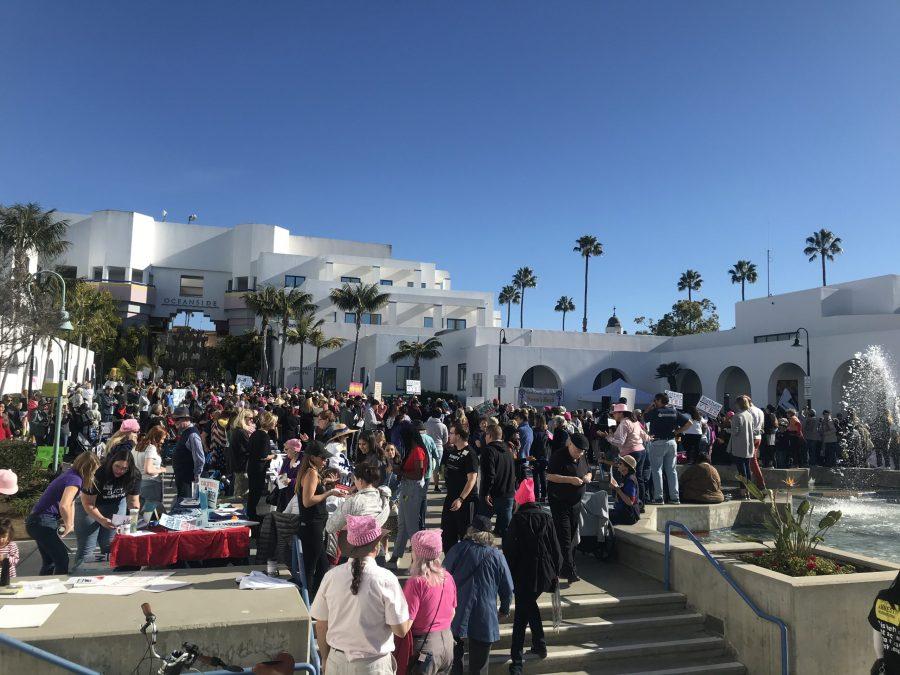The North County San Diego Women’s March held a morning rally of approximately 200 people on Saturday, Jan. 18, at the Oceanside Civic Center. In line with the theme of “Embrace, Educate, Empower!,” the rally included speeches from local activists and presentations by indigenous community members.
The NCSD Women’s March was held in concurrence with the broader nationwide Women’s March, which included demonstrations around the country in cities such as Washington D.C., Chicago, and San Diego.
Activist Angela de Joseph, founder of Indivisible Watu and event producer of the Women of Color Roar breakfast, served as the emcee. The event began with a blessing and ceremony that paid respect to the local indigenous people and thanked attendees for coming.
Demonstrators held signs ranging from “Impeach Trump” to “Nevertheless, She Persisted” as a show of opposition to President Donald Trump’s policies.
Local activists delivered speeches on a variety of issues, ranging from immigration reform to environmental justice. Los Ojos Del Condor, a Chilean feminist group that seeks to educate San Diegans about events in Chile, led participants in a chant that denounced gender-based sexual violence titled “Un violador en tu camino,” which in English translates to “A rapist in your way.”
“Patriarchy is a judge that sentences us at birth,” the chant begins. “And our punishment is the violence you don’t see.”
In an interview with the UCSD Guardian, Congressman Mike Levin talked about the importance of the Women’s March in bringing attention to issues of concern for UC San Diego students.
“What I am hopeful of … is that UCSD really is a very engaged campus with student-centered concern of the future of our country, with issues like climate change and gun violence prevention,” Levin said.
Organizations that attended the event included Moms Demand Action and the North County LGBTQ Resource Center, as well as various local and presidential political campaign chapters.
The NCSD Women’s March also collected new clothing items for survivors of gender-based violence in donation stations around the rally site. Palomar Movimiento Estudiantil Chicanx de Aztlán, a Chicano empowerment group, presented an interactive art wall in remembrance of trans women of color who have been murdered.
Thurgood Marshall College senior Michael McCauley told the Guardian that he attended the Women’s March because of his agreement with their goals.
“I believe in strong, progressive policy for our state and our nation moving forward,” McCauley said. “I know that [in my position] as a student, I can do everything I can to volunteer, intern, and educate myself on the political processes that encompass [all] of us.”
The Women’s March first debuted on Jan. 21, 2017, the day after Trump’s inauguration, and marked the largest single-day protest in United States history. The Women’s March’s mission is to “to harness the political power of diverse women and their communities to create transformative social change.”
According to The Atlantic, the leadership of the Women’s March has been heavily criticized due to accusations of past anti-semitic comments. Former leading organizer Tamika Mallory and current board member Carmen Perez allegedly stated that “Jewish people bore a special collective responsibility as exploiters of black and brown people.”
These controversies have led local chapters such as the North County San Diego Women’s March to try to distance themselves as independent from the national organization.
The first Women’s March notably excluded pro-life feminist organizations such as New Wave Feminists and And Then There Were None. A number of local organizers have since created a splinter group, March On, after criticizing the New York-based Women’s March’s lack of “resonance” with red states.
The NCSD Women’s March plans to announce a conference in the coming weeks to further shine a light on issues discussed at the rally.
Photo by Troy Tuquero for the UCSD Guardian.














